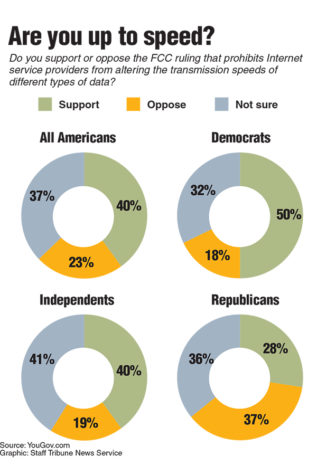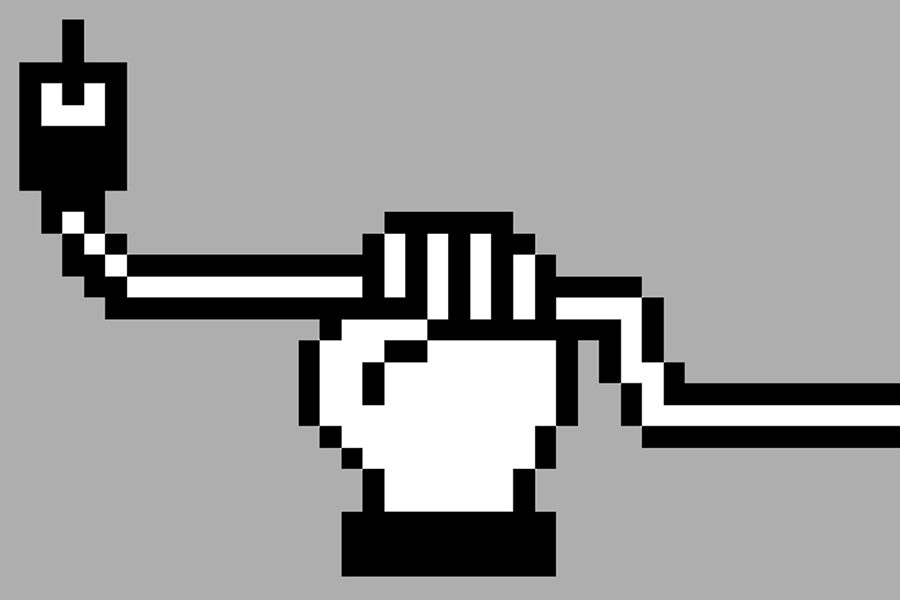No Neutrality Would Be Nonsense
Federal Communications Commission chairman Ajit Pai is currently pushing to roll back net neutrality rules established in 2015 and give more power to large telecommunication corporations.
PHOTO | Tribune News Service
A repeal of net neutrality rules would give Internet service providers too much control over telecommunication and threaten the existence of small businesses.
There has been much talk as of late regarding the upcoming Dec. 14 vote in which the Federal Communications Commission, headed by chairman Ajit Pai (designated by President Donald Trump), will decide whether or not to repeal net neutrality laws set during the Obama administration back in 2015. Revoking these laws would be illogical and catastrophic for the dynamic of nondiscriminatory online policies and give a disproportionate amount of influence to companies that already have too much of it.
The current net neutrality policies prevent prominent Internet service providers like Verizon and AT&T from breaking up their content into faster and slower lanes and “throttling,” or prohibiting someone’s ability to view material from certain companies, according to PBS. These laws ensure that businesses paying to display content with these corporations are treated fairly and equally for protection of freedom in the airways.
The origin of the measure to repeal this came from Pai, who believes the current laws are “hurting businesses” and preventing their financial profit and growth, according to PBS. Repealing this measure though would be extremely unethical and lead down the road to a corporate authoritarianism by which these major companies could pick and choose what consumers receive in terms of speeds and reception, harming the businesses that cannot pay the demands.

Poll asking Americans if they support the FCC Net Neutrality rulings.
Furthermore, if there was no net neutrality, broadband providers would be able to increase their prices and manipulate web traffic in such a way that they could charge whatever they wanted to allow quicker access, according to Bloomberg. Many of these service providers already have such an authority over the nation and moves in this direction would lay the groundwork for an irreversible telecommunicative monopoly. This would endanger the markets of those on their receiving ends and resurface a big business threat to smaller companies.
The conversation about these neutrality laws came largely after the election of Donald Trump and his vocalized animosity towards anything associated with the Obama administration. Since his inauguration, from immigration to health care, Trump has made a conscious effort to dismantle many of the policies implemented by Obama, according to USA Today. These numerous attempts have reached a point where, regardless of the subject matter, Trump has tried to repeal them for the mere sake that they were enacted by Obama.
This trend calls to question the integrity and justification behind Trump’s and Pai’s unified pushes for virtually abolishing net neutrality laws and opening the gates for a biased and inequitable Internet. The very nature of rolling back these laws is contradictory to the democratic majority, by which 78 percent of Americans across the political spectrum favored net neutrality rules in a May poll conducted by Mozilla.
The illogicality of this proposed reversal is highlighted further in its impending legal aftermath. A significant number of public interest groups have already vocalized that they would sue if the FCC voted “yes” on the measure, according to the New York Times. These lawsuits would likely fall on the shoulders of Congress, taking up unnecessary time and thus further preventing lawmakers from focusing on the most pressing national needs.
Distribution of power is a complicated balance and can easily concentrate too much in one set of hands. If there were no net neutrality, a balance would cease to even exist and the very essence of free speech and representation would be threatened. Net neutrality is an essential component of telecommunication and its impending fate will make or break the future of airway integrity.



